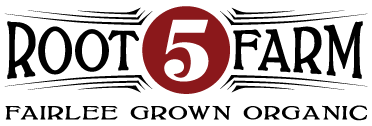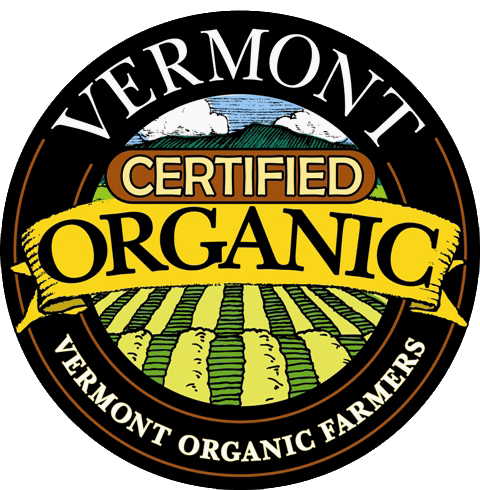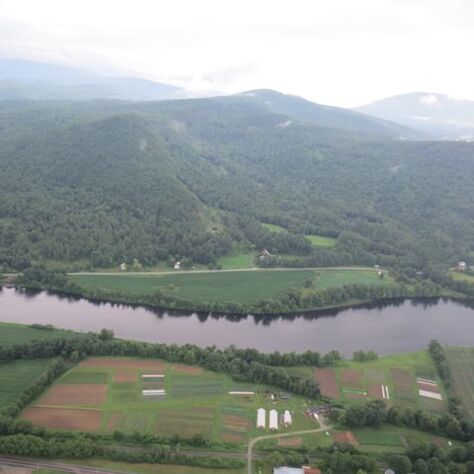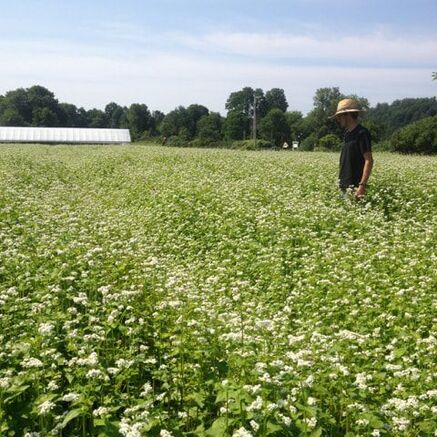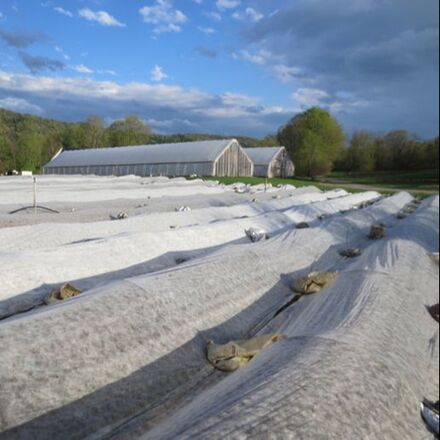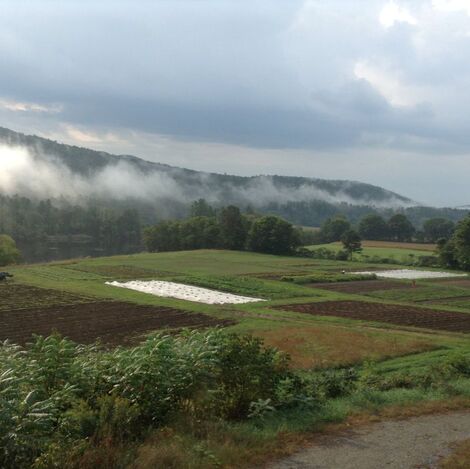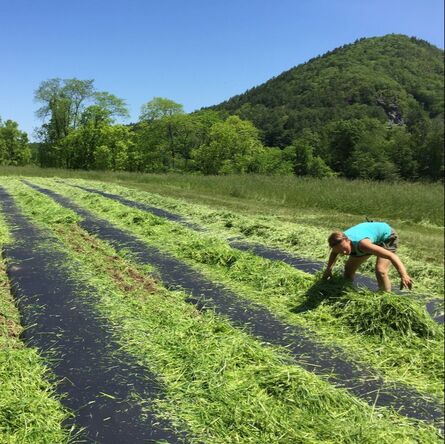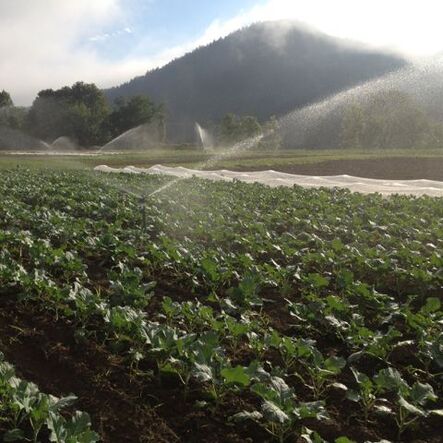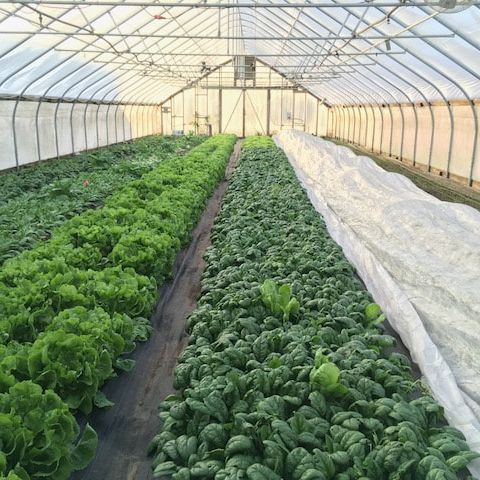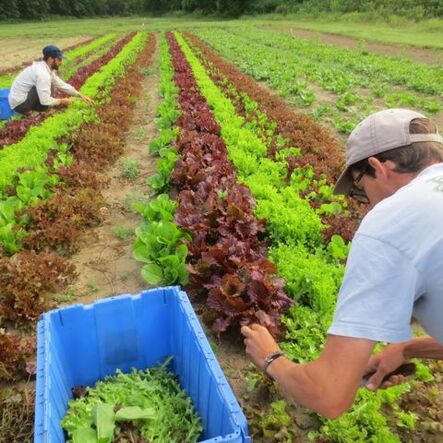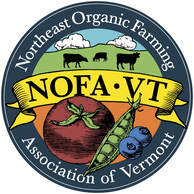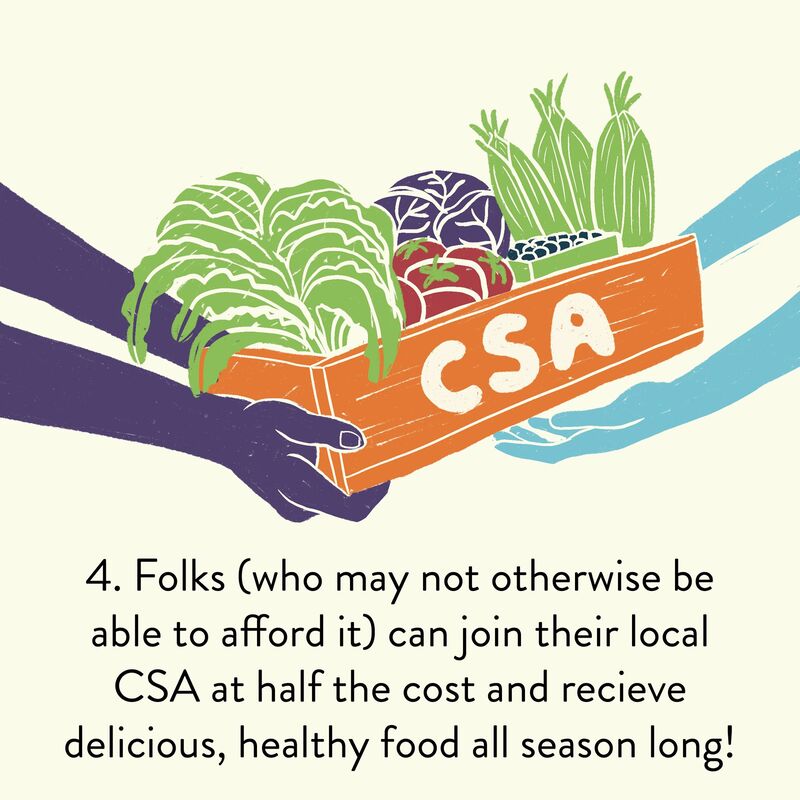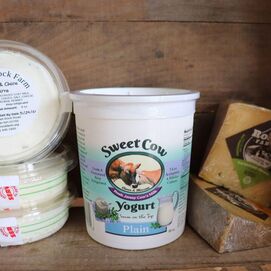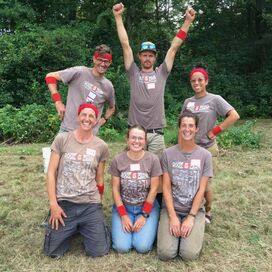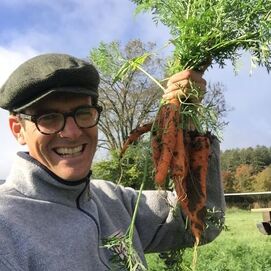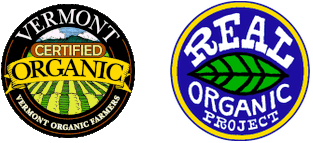|
Root 5 Farm is a certified organic vegetable farm located on 38 acres in Fairlee, Vermont, along the Connecticut River. The fertile river bottom soils provide a rich environment for growing over 100 different varieties of vegetables. The land has been protected from development through a conservation easement with the Vermont Land Trust.
The farm has been certified organic by Vermont Organic Farmers (VOF) since 2006. We're dedicated to growing practices that use a holistic approach to soil fertility and plant health. We build our soil through crop rotation, cover cropping, and minimal tillage. We're committed to a healthy workplace, environment, and community, and our products are infused with that attention. You’ll taste the difference! |
|
The Land
The farm is beautifully situated on 38 acres of terraced land above the Connecticut River. The land is conserved with the Vermont Land Trust. The farm has excellent sandy loam soils for growing vegetables. We have about 7 acres dedicated to vegetable production and about 1/2 acre planted to perennial asparagus, rhubarb, and blueberry crops, with plans to expand our perennial crop production in the coming years. Cover Cropping
We grow about 7 acres of cover crops each year in order to build nutrients and organic matter in the soil. Cover crops also hold the soil in place and prevent erosion when we're not growing a vegetable crop. We let cover crops like buckwheat and vetch go to flower, which provides excellent food and habitat for pollinators. While cover crops don't contribute directly to our farm's annual income, we know there is tremendous long-term value in building our soils and improving the health of our land for the future! Row Covers
We use row covers on certain crops to exclude pests and eliminate the need for using sprays to manage insect damage. We also use row covers to extend the season by keeping crops protected from frost. It requires extra time, expense, and effort to manage row covers on our crops, but they're an important part of our organic production system. 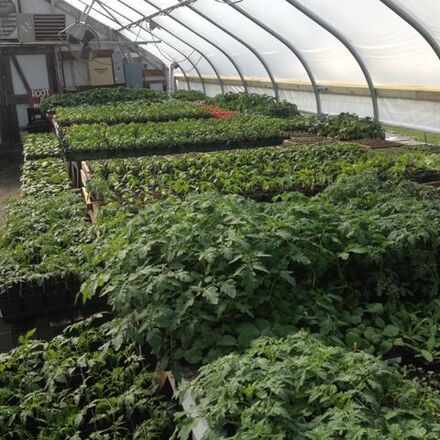
Propagation Greenhouse
Many of our vegetable seedlings are started in a heated greenhouse before they're transplanted by hand into the fields. We use a wood pellet furnace to heat our greenhouse and seed into rich potting soil from Vermont Compost Company to make healthy transplants. The greenhouse is started every season in early March with onions, leeks, scallions, tomatoes, and peppers first in line. It also serves as an excellent space to dry and cure onions, garlic, squash, and sweet potatoes in late summer and fall. Wash and Pack
Root 5 Farm is certified in best practices for produce safety through the CAPS program (Community Accreditation in Produce Safety). Immediately after crops are harvested from the field, they're brought to the wash station which is the hub of our operation. We've designed a wash station that is bright, organized, easy to clean, and in compliance with national Food Safety Standards. Produce is washed with clean cold water from our deep well, which is tested annually. Once washed, produce goes into a large walk-in cooler to ensure the freshness and quality. |
Crop Rotation
We carefully plan the rotation of our crops to manage our soil fertility and avoid problems with soil-borne diseases and soil-dwelling insects. This is an extremely important part of our organic management plan. Susceptibility to pests and diseases runs in plant families, so we plan our rotations by plant family. In addition, each crop has different nutrient requirements, which affects soil balance differently. So we also rotate by nutrient requirements. Mulch, Tarps, Cultivation
We've developed a series of tools and techniques that effectively control weeds but minimize soil disturbance on our farm. For long season crops, we mulch between the rows with straw or landscape fabric. We grow our own straw mulch on the farm. For successional fast-growing crops, we prepare stale seedbeds using large tarps to cover the soil before planting. We also control weeds through precise timing of tractor and hand cultivation methods. Herbicides are never used on our farm. Irrigation
A good, clean water source is essential for vegetable growing. Our irrigation system is necessary because of the farm’s light sand loam soils and regular watering is important for healthy plant growth. We irrigate primarily in the spring and early summer, as we are seeding and transplanting many new crops in the fields. We draw our irrigation water from the Connecticut River and also from our well. Well water is tested annually. High Tunnels
Season extension is important for farming in our northern climate. Early spring crops can be sown inside our high tunnels while there is still snow on the fields outside. Heat loving crops like tomatoes, cucumbers, and peppers can be grown in the tunnels during the summer to get an earlier harvest and to protect plants from heavy rains and diseases. Hardy greens, like spinach and kale, can be grown in the high tunnels to ensure a fresh supply of greens during the winter months. Harvest
We take great pride in the freshness and quality of our product, and we carefully harvest our crops by hand at the peak of ripeness. During the height of the season, we harvest almost every day of the week to ensure our customers receive the freshest produce possible. |
Good Food for ALL
|
VT Farm Share Program:
NOFA-VT's cost-sharing program that offers financial support to limited-income Vermonters for purchasing a CSA share. Participants receive up to a 50% subsidy of a CSA share from Root 5 Farm. To apply for a subsidized share, please visit NOFA-VT, fill out the application. Please also contact us and let us know that you are applying for a NOFA Farm Share. To donate, you can help to share the harvest by donating to the Farm Share Program as you sign up online for your CSA share this season. |
Share-a-Share Program:
We work closely with Willing Hands to donate thousands of pounds of extra wholesome food to our neighbors in need every year. Willing Hands picks up surplus vegetables at our farm every Tuesday, they come weekly to glean "seconds" from our fields before we till them in, and they pick up any extras after farmers market every Saturday. Willing Hands provides the critical link between surplus on our farm and our neighbors experiencing food insecurity. We're proud to partner with Willing Hands to help provide nutritious food to members of our community through the Share-a-Share Program. Willing Hands will pick up the share from our farm and distribute it to one of their recipient sites each week. Donations are tax deductible. |
Your choices make a difference. Organic matters.
"Organic production is not simply the avoidance of conventional chemical inputs, nor is it the substitution of natural inputs for synthetic ones. Organic farmers apply techniques such as crop rotations and the use of composted animal manures and green manure crops, in ways that are economically and environmentally sustainable. In organic production, overall system health is emphasized, and the interaction of management practices is the primary concern. Organic producers implement a wide range of strategies to develop and maintain biological diversity and replenish soil fertility.”
-Organic Agriculture Overview, USDA, Cooperative State Research, Education, and Extension Service (CSREES), 2007.
|
|
|
|
Root 5 Farm
Danielle Allen & Ben Dana 2340 US Route 5 North Fairlee, Vermont 05045 (802) 923-6339 [email protected] [email protected] |
